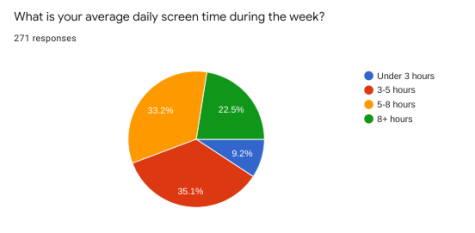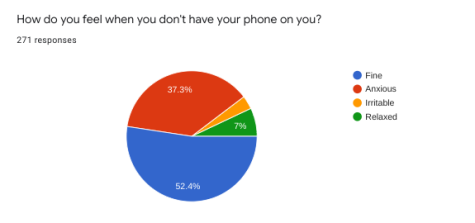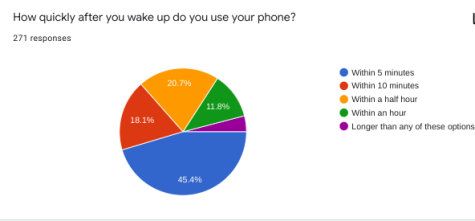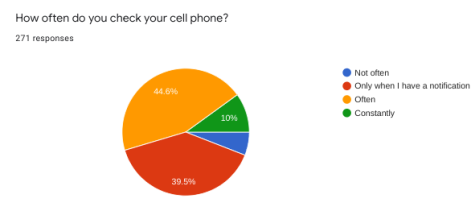Students feel the effects of cell phone addiction
May 6, 2022
It’s no secret that smartphones are addictive, especially for the more recent generations, Generation Z and Generation Alpha. In fact, cell phone addiction has become an epidemic across the nation, but also right here in Oshkosh. Based on a North Star survey, students at Oshkosh North experience many symptoms of cell phone addiction and often don’t know how to help themselves.
The American Academy of Pediatrics recommends that teenagers use their phones for no longer than 2 hours a day. Out of 271 respondents, only 9.2% of North students use their phones for less than 3 hours a day. 35.1% of respondents use their phones for 3-5 hours, while 55.7% use their phones for more than 5 hours per day – some students (22.5%) using their phones for over 8 hours per day, 6 hours more than what is recommended, which shows an alarming dependency to social media.

“I mainly use my phone when I’m working on social media and communicating with other people,” says Maddi Selner, a sophomore at Oshkosh North.
Lay Wah, a junior at Oshkosh North admits she uses it more than she would like to.
“I hate that I can’t put it down sometimes. It wastes my time, and it distracts me,” Wah says.
Not surprisingly, 40.3% of respondents reported that they felt anxious or irritable when they did not have their cell phones on their person. Helpguide.org reports that experiencing anger, irritability, and restlessness while you’re without a cellphone are some of the main warning signs of cell phone addiction.

“When I don’t have my phone, I feel cut off,” Selner says. “[I am] absolutely addicted to it. Most of my everyday tasks revolve around it, like school, what I eat, how I dress, and my hobbies.”
Selner’s anxiousness arises from his use of the social media app TikTok, where he has over 40,000 followers.
“The numbers [of likes and views] I’m seeing on TikTok stress me out,” Maddi says. “I feel like if I don’t give perfect content to those thousands of people. It’s just gonna make me lose everything I worked for. So the numbers definitely stress me out.”
Junior Annie Hewwit often uses her phone as a shield during social situations.
“I feel anxious without my phone,” Hewwit says. “When I’m in an awkward situation, I can just be on my phone and I’ll be out of that situation, so I don’t just have to stand around and fidget with my hands. I also feel nervous without it, because what if there’s an emergency?”
However, not all students feel the same way. While many students reported feelings of uneasiness without their phones, 52.4% of respondents felt fine without them, with an additional 7% of students even feeling relaxed without their phones.
“I use it everyday for about three hours,” says Wah. “I like that it gives you an easy way to solve problems in life, but I feel fine when I’m without it.”
Besides how much students use their phones, when students use their phone shows addiction as well.

According to the survey, almost half (45.4%) of respondents claimed to use their phones within 5 minutes of waking, which is another sign of addiction – constantly needing to know what you missed while you’ve been away. It is recommended that your phone should be used about an hour after you wake up, because starting your day with a phone in your hand can lead to a stressful one, Bustle claims.
The time that students fall asleep is also affected by their phones. Only 23.6% of surveyees claimed that they never stay up later than they normally do because they are on their phone. 48.7% fall victim to this at least once or twice a week, 17.3% staying up later than they intend three or more times a week, and 10.3% reported that this happens every day.
Frequent cell phone use and addiction has been scientifically proven to shorten attention spans. After all, a notification and the flash of a screen can easily distract someone from a sheet of boring math homework. Students were also asked how often they check their phones. 39.5% said that they only check their phone when they see that they have a notification, but 44.6% replied that they check it “often.” Exactly 10% claimed they check it “constantly.”

This article wasn’t made to shame teenagers who have formed a dependency to the Internet; it was made to bring light to the high rates of cell phone addiction among adolescents.
An easy first step to limiting screen time is to turn notifications off if you find yourself drawn to your phone when you hear a ping. This way, you won’t be distracted while doing tasks such as homework and studying. An optional question on the survey asked students about situations where they wouldn’t use their phones. Obviously, though, this isn’t always easy, which is why turning off notifications (or even turning your phone off completely) can be really helpful and beneficial while doing important tasks. You should always keep notifications OFF while you are driving, however, because distractions on the road are lethal.
There are certain apps that monitor your screen time and app usage, such as Offtime, Flipd, Daytime (Android,) and a built-in Digital Wellbeing app on models Android 9 and above. These apps track the amount of time you spend on certain apps and set time restrictions on them, so you don’t use them for an extended period of time. You set the limits, and the app times your usage, then locks you out of your restricted apps once your set time is up. You can also set timers during specific parts of the day, such as dinner time, where you can’t use any apps until those timers are up.
If you struggle with getting yourself to sleep at a decent time, the apps mentioned above can put “bedtime” timers on, which will lock you from your phone until the morning. If you don’t want to use these apps, but still want to get more sleep, it is recommended that you turn off your phone thirty minutes to two hours before bed. Put it in a place where you won’t feel the need to grab it, or keep it in a locked area if you can’t trust yourself with staying away from your device. While winding down for bed, try to do activities that don’t involve any electronics.
If you feel restless without your phone on hand, or if you have a hard time staying away from it, there’s a good chance that you are addicted to it. There are things you can do, however, to limit your screen time. While it’s something you’ll have to do on your own, you are more than capable of succeeding and living a happier, more productive life without feeling the need to reach for your phone.


